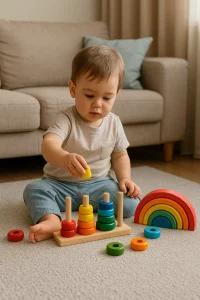Why Communication is the Cornerstone of a Strong Marriage
By Wellness Hub
Last Updated: September 5, 2024
In any marriage, communication is more than just talking—it’s the way you connect, share, and understand each other. Think of it as the bridge that keeps your relationship strong, allowing you to navigate life’s ups and downs together. When you communicate well, you’re not just exchanging words; you’re building trust, intimacy, and a deeper connection with your partner.
So, why is communication the cornerstone of a healthy marriage? Simply put, it’s the foundation upon which every successful relationship stands. Without it, misunderstandings can pile up, small issues can become big problems, and the emotional bond that brought you together can start to weaken. On the other hand, when you and your partner make an effort to communicate openly and honestly, it’s like adding bricks to that foundation, making it stronger and more resilient over time.
Book Your Marriage Counselling Now
Understanding Communication in Marriage
Communication in marriage is more than just exchanging words; it’s the lifeline of your relationship. In this context, communication means sharing your thoughts, feelings, and needs in a way that fosters understanding and connection with your partner. It’s not just about talking—it’s about being truly heard and listening with intention. Whether it’s a quick chat about your day or a deeper discussion about your future together, effective communication helps keep your relationship aligned and healthy.
Also read: What is Emotional Connection in Marriage and Why It Matters
Types of Communication: Verbal, Non-Verbal, and Emotional
Communication in marriage comes in various forms, each playing a unique role in how you connect with your spouse.
- Verbal Communication involves the words you use in conversations, whether you’re discussing plans, sharing feelings, or resolving conflicts. Clear and honest verbal communication helps ensure that both partners are on the same page.
- Non-Verbal Communication includes the unspoken cues like body language, facial expressions, and eye contact. Sometimes, a smile or a reassuring touch speaks volumes more than words ever could. Paying attention to these non-verbal signals can enhance your understanding of each other’s needs and emotions.
- Emotional Communication dives deeper into expressing and responding to feelings. It’s about sharing your inner world and being open to your partner’s emotions, even when they’re tough to talk about. This type of communication builds emotional intimacy and trust, making it easier to navigate the ups and downs of married life.
Also read: Why Don’t More Couples Choose Marriage Counseling?
The Difference Between Communicating and Merely Talking
It’s easy to think that if you’re talking, you’re communicating—but there’s a key difference. Talking is just the act of exchanging words, while true communication involves active listening, understanding, and responding with empathy. In marriage, communication isn’t just about saying what’s on your mind; it’s about making sure your partner feels heard and valued. This deeper level of interaction strengthens your relationship by fostering a supportive and respectful environment.
The Role of Communication in Building Trust and Intimacy
Open communication is the glue that holds a marriage together, and it plays a crucial role in building trust between partners. When you communicate openly, you’re not just sharing your thoughts—you’re showing your partner that you value honesty and transparency in your relationship. This openness fosters a sense of safety, allowing both of you to express your true selves without fear of judgment or misunderstanding. It’s through this kind of communication that trust is built, as both partners feel secure knowing they can rely on each other to be truthful and supportive.
Read more: Communication Exercises for Couples to Try at Home
Building Trust Through Open Communication
Trust in marriage doesn’t happen overnight; it’s built one conversation at a time. When you regularly communicate your needs, fears, and desires, you create a space where both partners feel seen and understood. For instance, sharing your worries about work or being honest about a mistake shows your partner that you’re willing to be vulnerable. This vulnerability invites your spouse to do the same, strengthening the trust between you. By keeping communication lines open, you both learn to rely on each other as confidants and partners, solidifying your bond.
Connecting Communication and Emotional Intimacy
Emotional intimacy goes beyond the physical aspects of a relationship—it’s about feeling emotionally connected and close to your partner. Communication is the key to achieving this level of intimacy. When you share your inner thoughts, dreams, and even insecurities, you’re allowing your partner into your personal world. This sharing creates a deep emotional connection that’s unique to your relationship. It’s like building a bridge between your hearts, where every honest conversation adds another strong link.
Also read: Marriage Counseling: Signs It Can Save You
Benefits of Effective Communication in Marriage
Effective communication in marriage goes beyond just exchanging words; it’s a powerful tool that nurtures your relationship in many ways. When communication is clear and respectful, it becomes the cornerstone for resolving conflicts, making decisions together, and providing the emotional support that every marriage needs. Let’s explore some of the key benefits of effective communication in your relationship.
1. Conflict Resolution: Solving Disagreements Peacefully
Every couple faces disagreements—it’s a natural part of sharing your life with someone. However, it’s how you handle these conflicts that makes all the difference. Open communication allows you to address issues before they escalate. When both partners feel safe to express their perspectives without fear of backlash, it’s easier to find common ground. For instance, instead of arguing over who’s right or wrong, you can focus on understanding each other’s feelings and working towards a solution that satisfies both sides. This not only resolves the immediate conflict but also strengthens your relationship by reinforcing that you’re on the same team.
2. Joint Decision-Making: The Role of Communication
Making decisions together is another crucial aspect of marriage, from everyday choices like what to cook for dinner to bigger decisions like financial planning or parenting styles. Effective communication ensures that both partners are heard and involved in the decision-making process. This collaborative approach not only leads to better decisions but also prevents feelings of resentment or being sidelined. By discussing options, weighing pros and cons, and agreeing on a path forward, you build a partnership that values mutual respect and shared goals.
3. Enhancing Emotional Support and Understanding
One of the greatest gifts of effective communication is the emotional support it provides. When you communicate openly, you’re able to share your joys, fears, and concerns, creating a safe space where both of you feel understood and valued. This emotional connection is vital for a strong marriage, as it helps you navigate the highs and lows of life together. Whether it’s comforting your partner after a tough day or celebrating a personal success, being able to communicate your support reinforces your bond and enhances your connection.
Comparison of Effective vs. Poor Communication in Marriage
| Aspect | Effective Communication | Poor Communication |
|---|---|---|
| Conflict Resolution | Peaceful and collaborative; both partners work together to find solutions, listen actively, and respect each other’s perspectives. | Argumentative and defensive; conflicts often escalate, leading to unresolved issues and lingering resentment. |
| Emotional Connection | Strong and intimate; partners feel connected, understood, and emotionally supported, which strengthens their bond. | Distant and disconnected; lack of emotional sharing creates a gap between partners, making the relationship feel more like cohabitation than a partnership. |
| Decision-Making | Joint and respectful; decisions are made together with input from both partners, leading to shared responsibility and satisfaction. | One-sided and resentful; one partner dominates decisions, causing the other to feel overlooked and undervalued, which breeds resentment. |
| Trust Building | Transparent and honest; partners feel secure sharing their true thoughts and feelings, which builds trust and a sense of safety in the relationship. | Secretive and untrustworthy; lack of openness leads to suspicion, eroding trust and making it difficult for partners to feel secure with each other. |
| Marital Satisfaction | High and supportive; communication enhances the overall quality of the relationship, making both partners feel valued and fulfilled. | Low and frustrated; poor communication leads to unmet needs, frequent misunderstandings, and a general sense of dissatisfaction with the marriage. |
Also read: 10 Frequent Marriage Problems and How to Deal With Them
Common Communication Barriers in Marriage
Even in the healthiest of marriages, communication barriers can arise and disrupt the flow of understanding between partners. Recognizing these barriers is the first step toward overcoming them and fostering a more open and connected relationship. Let’s take a closer look at some common communication challenges that couples face and how they can impact your marriage.
Miscommunication and Misunderstandings
One of the most common barriers in marital communication is miscommunication, which can quickly lead to misunderstandings. It often happens when messages are unclear, assumptions are made, or non-verbal cues are misinterpreted. For example, a simple text message taken the wrong way or a casual comment misheard can spark unnecessary conflict. To minimize these misunderstandings, it’s important to be as clear and direct as possible and to confirm that both of you are on the same page. Sometimes, a quick “Did I get that right?” can save a lot of trouble down the road.
Avoidance of Difficult Conversations
It’s natural to want to avoid uncomfortable topics, but steering clear of difficult conversations can create a communication gap that grows over time. Whether it’s about finances, intimacy, or personal grievances, avoiding these talks can lead to built-up resentment and a sense of disconnection. When issues are swept under the rug, they don’t disappear; they linger, affecting your bond and creating an emotional distance. Addressing tough topics with patience and empathy can help bridge the gap and prevent small issues from becoming bigger problems.
External Factors: Stress and Time Constraints
Life’s demands—like work, parenting, and other responsibilities—can often leave little time for meaningful communication with your partner. Stress and time constraints are external factors that can greatly hinder your ability to connect. When you’re overwhelmed or pressed for time, it’s easy to let communication fall by the wayside, which can make your partner feel neglected or unimportant. To combat this, it’s crucial to prioritize your relationship by setting aside regular time to talk, even if it’s just a few minutes each day. This effort shows your partner that your relationship is a priority, despite the hectic pace of life.
Tips for Improving Communication in Your Marriage
Improving communication in your marriage doesn’t require grand gestures; it’s often the small, consistent efforts that make the biggest difference. Here are some practical tips that can help you and your partner communicate more effectively, building a stronger and more connected relationship.
1. Active Listening: Techniques and Importance
Active listening is one of the most powerful communication tools you can use in your marriage. It involves fully focusing on your partner when they’re speaking, without interrupting or thinking about your response while they’re talking. The goal is to truly understand what your partner is saying and feeling. Techniques like maintaining eye contact, nodding, and occasionally summarizing what they’ve said can show that you’re engaged and care about their perspective. Active listening makes your partner feel valued and understood, which can significantly reduce misunderstandings and strengthen your bond.
2. Expressing Needs and Feelings Clearly and Respectfully
It’s important to express your needs and feelings in a way that is both clear and respectful. Instead of assuming your partner knows what you’re thinking or feeling, take the time to articulate it. Use straightforward language and avoid letting emotions dictate your words. For instance, instead of saying, “You never help around the house,” try saying, “I feel overwhelmed when there’s a lot to do, and I’d appreciate some help with the chores.” This approach not only makes your needs clear but also opens the door for constructive conversation rather than defensiveness.
3. Regular Check-Ins and Setting Aside Time for Meaningful Conversations
In the hustle of daily life, it’s easy to lose touch with each other. Regular check-ins, whether they’re daily, weekly, or even monthly, can keep you connected. These check-ins don’t have to be long or formal—they can be as simple as asking, “How was your day?” or “Is there anything on your mind?” Setting aside time for more in-depth conversations is also crucial. Schedule regular date nights or quiet moments at home where you can discuss more significant topics or simply reconnect without distractions. This consistent effort shows your partner that your relationship is a priority.
4. Using “I” Statements to Avoid Blame
When discussing sensitive topics or conflicts, using “I” statements instead of “You” statements can make a big difference in how your message is received. For example, saying “I feel upset when plans change at the last minute” focuses on your feelings rather than blaming your partner with “You always change plans last minute.” This subtle shift in language can prevent defensiveness and promote a more open and honest dialogue. It allows you to express your feelings without making your partner feel attacked, which paves the way for more productive conversations.
Also read: How Long Does Effective Marriage Counseling Take?
The Impact of Poor Communication on Marriage
Effective communication is essential for a thriving marriage, but what happens when communication breaks down? The impact of poor communication can ripple through every aspect of your relationship, leading to misunderstandings, emotional distance, and even long-term dissatisfaction. Let’s explore how a lack of communication can affect your marriage and what it means for your relationship’s stability.
Misunderstandings and Resentment
When communication is lacking, misunderstandings can become a common occurrence. Without clear and open dialogue, it’s easy to misinterpret your partner’s words, actions, or even silence. For example, if one partner doesn’t express their needs or feelings, the other might assume everything is fine, leading to unmet expectations and growing frustration. Over time, these small misunderstandings can build up, creating a sense of resentment that’s hard to shake. The resentment then acts like a wall, making it even harder to communicate effectively and understand each other’s perspectives.
Emotional Distance and Disconnection
Poor communication can also lead to emotional distance, where partners start to feel like they’re drifting apart. When conversations are reduced to surface-level exchanges or practical discussions, the emotional connection that once bonded you can begin to fade. This disconnection isn’t always immediate; it often happens gradually as you stop sharing your thoughts, fears, and dreams. Without that emotional closeness, the relationship may start to feel more like a routine than a partnership. You might find yourselves living parallel lives under the same roof, but without the sense of unity that good communication brings.
Long-Term Effects on Marital Satisfaction and Stability
The long-term effects of poor communication can be significant, impacting overall marital satisfaction and stability. When communication issues go unresolved, they can erode the foundation of trust and support that your marriage is built on. Couples who struggle with communication often report feeling unsatisfied, unsupported, or misunderstood, which can lead to ongoing conflicts and a lack of fulfillment in the relationship. Over time, this dissatisfaction can wear down the commitment and motivation to stay together, putting the marriage at risk of breaking down completely.
Conclusion
Communication is the foundation of a healthy marriage. It helps build trust, closeness, and understanding between partners. Without good communication, even the strongest relationships can face problems. But by talking openly and honestly, you can handle any challenges together. From solving disagreements to making decisions as a team, effective communication is key to a happy and lasting marriage.
Improving how you communicate isn’t something that happens overnight; it’s an ongoing effort. Simple steps like listening carefully, expressing your feelings clearly, and setting aside time to talk can make a big difference. Remember, every conversation is a chance to connect and strengthen your bond. Keep working on these skills, and don’t hesitate to seek help if needed. At Wellness Hub, we offer resources and support to help couples like you build stronger, healthier relationships. With patience and practice, you can create a partnership that not only survives but thrives.
Frequently Asked Questions:
1. Why is communication important in a marriage?
Communication is crucial in a marriage because it helps build trust, resolve conflicts, and foster emotional intimacy between partners. Open and honest communication allows couples to understand each other’s needs and feelings, strengthening their bond and ensuring a healthy relationship.
2. What are common communication barriers in marriage?
Common communication barriers in marriage include miscommunication, avoidance of difficult conversations, and external factors like stress and time constraints. These barriers can lead to misunderstandings, emotional distance, and conflicts that weaken the relationship over time.
3. How can couples improve communication in their marriage?
Couples can improve communication by practicing active listening, expressing needs and feelings clearly, setting aside regular time for meaningful conversations, and using “I” statements to avoid blame. These simple strategies can help create a more open and supportive communication environment.
4. What is the impact of poor communication on a marriage?
Poor communication can lead to misunderstandings, resentment, emotional distance, and decreased marital satisfaction. Over time, these issues can erode the foundation of the relationship, making it difficult to maintain a healthy and stable marriage.
5. How does effective communication help in conflict resolution in marriage?
Effective communication helps in conflict resolution by allowing partners to express their perspectives and feelings without judgment. It enables couples to find common ground, address issues calmly, and work towards solutions that benefit both parties, reducing tension and strengthening their connection.
6. What role does communication play in building trust in marriage?
Communication plays a key role in building trust in marriage by fostering transparency and openness. When partners regularly share their thoughts and feelings, they create a safe space for honesty, which strengthens trust and makes the relationship more resilient.
7. How can I encourage my partner to communicate more openly?
Encouraging open communication with your partner involves creating a safe and non-judgmental space for discussions. Show genuine interest in their thoughts, listen actively, and respond with empathy. By modeling openness and being supportive, you can make your partner feel more comfortable sharing.
8. Can professional help improve communication in marriage?
Yes, seeking professional help such as couples therapy or counseling can significantly improve communication in marriage. Therapists can provide guidance, tools, and strategies tailored to your relationship’s needs, helping both partners communicate more effectively and resolve conflicts.
9. How often should couples communicate to maintain a healthy marriage?
There’s no set rule for how often couples should communicate, but regular, meaningful conversations are key to maintaining a healthy marriage. Daily check-ins, weekly discussions about important topics, and open dialogues during conflicts can all contribute to keeping the lines of communication strong and the relationship connected.
10. What are “I” statements, and why are they important in marital communication?
“I” statements are a communication tool used to express your feelings and needs without blaming your partner. For example, saying “I feel hurt when plans change suddenly” instead of “You always change plans” helps focus on your own experience rather than accusing your partner. This approach reduces defensiveness and fosters a more constructive and empathetic dialogue.
About the Author:
Prapoorna Mangalampalli
M.Sc., M.A., (Dual Masters in Psychology & English) – Counselor (6+ years of experience)
Prapoorna, with dual Master’s degrees in Psychology and English and over 6 years of experience, elevates human experiences through insightful counseling. She excels in online, marital, relationship, child, family, and career counseling. At Wellness Hub, she thrives in a team environment, valuing innovation, compassion, and client success.
Book your Free Consultation Today
Parent/Caregiver Info:
Client’s Details:
* Error Message








